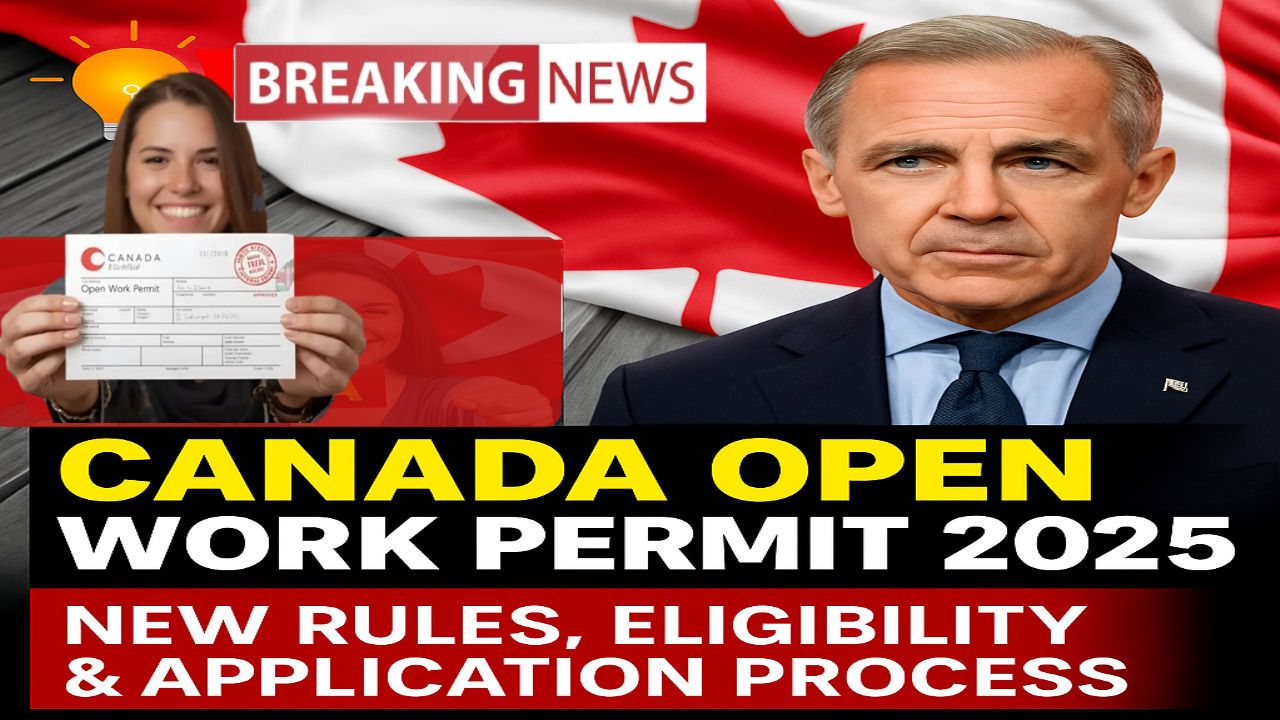Canada Open Work Permit (OWP) lets eligible foreign nationals work for almost any employer in Canada, without tying them to a single job or company. For students finishing studies, skilled workers in transition, and spouses or dependents of temporary residents, an OWP can be the quickest path to Canadian work experience, income stability, and ultimately a stronger profile for Permanent Residence (PR).
Table of Contents
Below is a clear, updated guide to how the OWP works in 2025: who qualifies, what it costs, which documents you need, how to apply online, how to track your file, and answers to common questions.
Canada Open Work Permit 2025 Quick Summary

Particulars |
Details |
|---|---|
Program |
Canada Open Work Permit (OWP) |
What it allows |
Work for almost any employer, any province/territory |
Typical validity |
About 1–3 years, depending on stream and passport validity |
Core use cases |
PGWP graduates, spouses/partners of eligible students or workers, bridging PR applicants, select humanitarian cases |
LMIA needed |
Not required for an OWP |
Government fees |
CAD 155 (processing) + CAD 100 (OWP holder fee); biometrics CAD 85 where applicable |
Application mode |
Online via IRCC secure account |
Official site |
What Is an Open Work Permit (and What It Is Not)
A Canada Open Work Permit authorizes you to work for any employer that is not on the ineligible list and in any location in Canada, subject to standard conditions (for example, medical exam requirements for health-care settings or working with children). Unlike a closed (employer-specific) work permit, the OWP is not linked to one employer or job, and it does not require a Labour Market Impact Assessment (LMIA).
Who commonly uses OWPs
- Post-Graduation Work Permit (PGWP) holders: Graduates of eligible Canadian designated learning institutions.
- Spouses/common-law partners of certain international students or temporary foreign workers (spousal OWP).
- Bridging Open Work Permit (BOWP) applicants: Individuals who have submitted a qualifying PR application and need to keep working while IRCC finalizes a decision.
- Select humanitarian or public policy groups: For example, vulnerable workers, some refugee claimants, and other policy-based cases.
Why the OWP Matters in 2025
Beyond giving you the freedom to change employers and locations, an OWP helps you:
- Gain Canadian work experience that may count toward programs like Express Entry (Canadian Experience Class) or Provincial Nominee Programs (PNPs).
- Transition to PR more smoothly via a Bridging OWP if you file an eligible PR application.
- Keep families together: spouses/partners and dependents can often live (and in some cases work or study) in Canada while the principal applicant works.
In 2025, the emphasis remains on streamlined online applications, clearer eligibility guidance by category, and faster digital communication within the IRCC portal making it easier to upload documents, receive messages, and monitor status in one place.
Eligibility Criteria (2025 Overview)
Eligibility depends on the category under which you apply for an OWP. Common pathways include:
- Spouse or Common-Law Partner of an eligible student or worker
- Relationship proof (marriage certificate or proof of common-law status).
- The principal student/worker must meet program-specific criteria (study or work authorization in good standing).
- Post-Graduation Work Permit (PGWP)
- Completion of an eligible program at a designated learning institution (DLI).
- Program and institution must meet PGWP rules; apply within the required timeline.
- Bridging Open Work Permit (BOWP)
- Proof you submitted a complete PR application under a qualifying stream (e.g., Express Entry, some PNP streams).
- Your current work authorization is expiring soon and you need to bridge your status.
- Other policy-based OWPs
- Examples: vulnerable workers, certain humanitarian pathways, select pilot programs.
General requirements for most applicants
- Valid passport (with enough remaining validity to cover the requested permit).
- Admissibility to Canada (medical/security).
- Financial capacity to support yourself and any accompanying family members.
- If already in Canada, maintain valid temporary resident status.
Required Documents (typical)
- Passport (clear bio page and all pages with stamps/visas; ensure ample validity).
- Digital photo meeting IRCC specifications.
- Proof of eligibility for your stream (e.g., study completion letter and transcript for PGWP; relationship proof plus principal’s status for spousal OWP; PR submission proof for BOWP).
- Police certificate(s) if requested.
- Medical exam results (upfront or upon request) if you intend to work in certain occupations or have lived in designated countries.
- Proof of funds (when applicable).
- Fee payment receipt (see fees below).
Fees and Typical Processing
Fee Type |
Amount (CAD) |
|---|---|
Work Permit Processing |
155 |
Open Work Permit Holder |
100 |
Biometrics (if required) |
85 |
Processing times vary by category and country of residence. Expect variation based on volume, biometrics, medical exam timing, and whether IRCC requests additional documents.
Step-by-Step: How to Apply Online
- Create or sign in to your IRCC secure account (GCKey or Sign-In Partner).
- Start an application for a work permit and choose the Open Work Permit option appropriate to your category.
- Complete the forms carefully (be precise and consistent with dates, addresses, and employment history).
- Upload all documents in the requested formats and sizes.
- Pay the fees (processing + OWP holder fee + biometrics if applicable).
- Give biometrics (if required) and complete a medical exam when instructed or upfront if advised.
- Submit and save your confirmation number. Monitor Messages in your IRCC account for updates or requests.
How to Check Your Application Status
- Log in to your IRCC account and select View my applications.
- Check the status bar and Messages for requests (e.g., additional documents, medical, passport submission).
- If IRCC asks for more information, respond before the deadline to avoid delays.
Working in Canada on an OWP: Conditions and Good Practices
- You may change employers and work location without a new permit, provided the employer is not ineligible and the job is not in a restricted occupation.
- If you plan to work in health care, child care, or with vulnerable populations, a medical exam is typically required before you begin that work.
- Apply for a Social Insurance Number (SIN) after arrival/approval so you can be paid and taxed properly.
- Keep proof of status (ePermit/letter) handy for HR onboarding and provincial services.
Common Mistakes to Avoid
- Expired passport cutting your work-permit validity short. Renew early.
- Incomplete proofs (e.g., missing relationship documents for spousal OWP, or missing completion letter for PGWP).
- Ignoring IRCC messages or missing document deadlines.
- Assuming job offers are required for an OWP category that does not need one.
- Overstaying status: if your current permit expires soon, explore extension or bridging options early.
Latest 2025 Notes
- IRCC continues to emphasize online filing, clearer document checklists, and digital correspondence to streamline decisions.
- Priority handling remains focused on key labour needs and eligible family reunification cases.
- Always verify the specific eligibility rules for your category (PGWP, spousal, BOWP, etc.) before you apply.
Frequently Asked Questions (FAQs)
1) How long is an Open Work Permit valid?
Typically 1–3 years, depending on your category, passport validity, and the rules of your stream (e.g., PGWP length depends on program length).
2) Do I need a job offer to apply?
Generally no for most OWP categories (e.g., PGWP, spousal OWP, BOWP). Your eligibility flows from your category, not a specific employer.
3) Can I change employers after approval?
Yes. An OWP is not employer-specific. You can change employers without applying for a new work permit, subject to standard conditions.
4) Does OWP experience help with PR?
Yes. Canadian work experience gained on an OWP can support PR pathways such as Express Entry (CEC) or PNPs.
5) What are the total government fees?
Most OWP applications pay CAD 155 (processing) + CAD 100 (OWP holder fee). Biometrics are CAD 85 if required.
6) Can my spouse or dependents work or study?
Often yes, but their eligibility depends on your category and their own applications (spousal OWP, study permits for school-age dependents, etc.).
For More Information Click HERE











